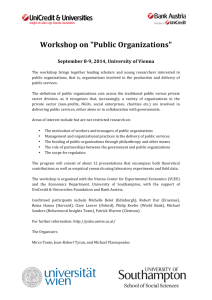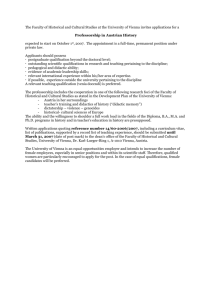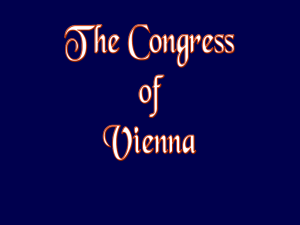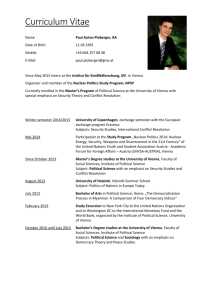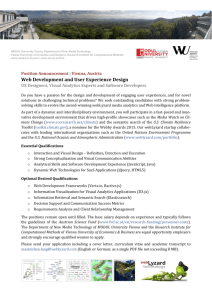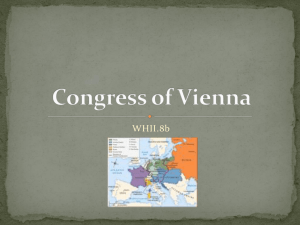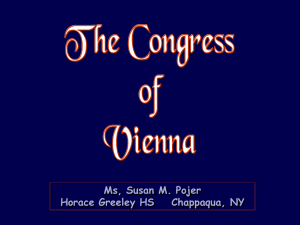Experience report
advertisement
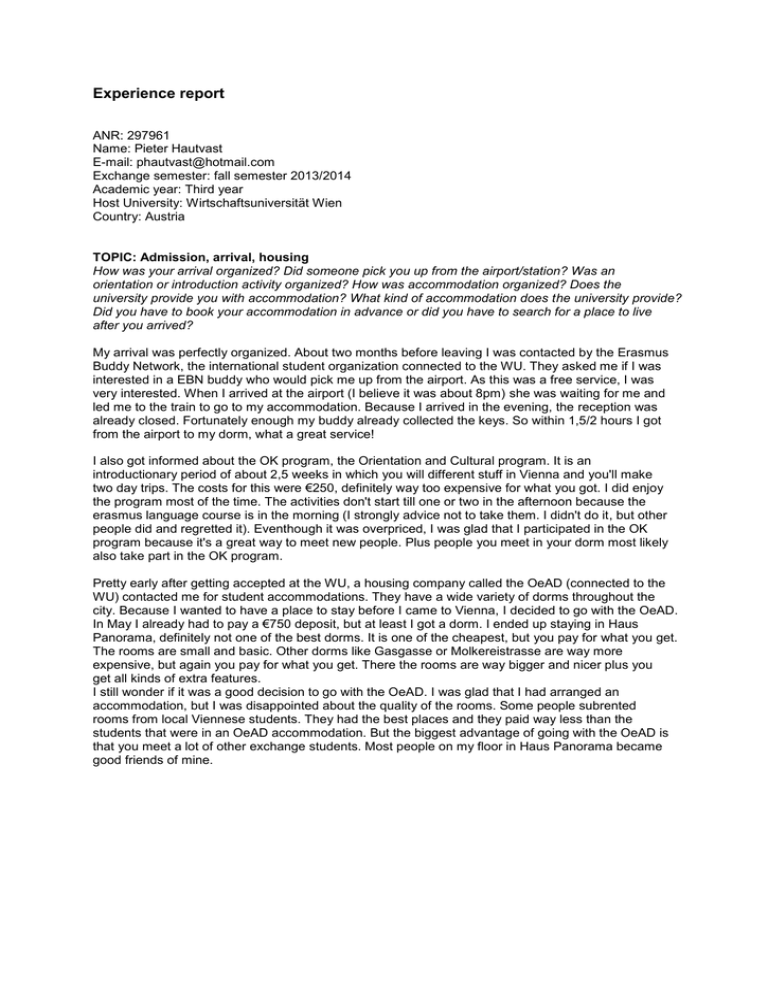
Experience report ANR: 297961 Name: Pieter Hautvast E-mail: phautvast@hotmail.com Exchange semester: fall semester 2013/2014 Academic year: Third year Host University: Wirtschaftsuniversität Wien Country: Austria TOPIC: Admission, arrival, housing How was your arrival organized? Did someone pick you up from the airport/station? Was an orientation or introduction activity organized? How was accommodation organized? Does the university provide you with accommodation? What kind of accommodation does the university provide? Did you have to book your accommodation in advance or did you have to search for a place to live after you arrived? My arrival was perfectly organized. About two months before leaving I was contacted by the Erasmus Buddy Network, the international student organization connected to the WU. They asked me if I was interested in a EBN buddy who would pick me up from the airport. As this was a free service, I was very interested. When I arrived at the airport (I believe it was about 8pm) she was waiting for me and led me to the train to go to my accommodation. Because I arrived in the evening, the reception was already closed. Fortunately enough my buddy already collected the keys. So within 1,5/2 hours I got from the airport to my dorm, what a great service! I also got informed about the OK program, the Orientation and Cultural program. It is an introductionary period of about 2,5 weeks in which you will different stuff in Vienna and you'll make two day trips. The costs for this were €250, definitely way too expensive for what you got. I did enjoy the program most of the time. The activities don't start till one or two in the afternoon because the erasmus language course is in the morning (I strongly advice not to take them. I didn't do it, but other people did and regretted it). Eventhough it was overpriced, I was glad that I participated in the OK program because it's a great way to meet new people. Plus people you meet in your dorm most likely also take part in the OK program. Pretty early after getting accepted at the WU, a housing company called the OeAD (connected to the WU) contacted me for student accommodations. They have a wide variety of dorms throughout the city. Because I wanted to have a place to stay before I came to Vienna, I decided to go with the OeAD. In May I already had to pay a €750 deposit, but at least I got a dorm. I ended up staying in Haus Panorama, definitely not one of the best dorms. It is one of the cheapest, but you pay for what you get. The rooms are small and basic. Other dorms like Gasgasse or Molkereistrasse are way more expensive, but again you pay for what you get. There the rooms are way bigger and nicer plus you get all kinds of extra features. I still wonder if it was a good decision to go with the OeAD. I was glad that I had arranged an accommodation, but I was disappointed about the quality of the rooms. Some people subrented rooms from local Viennese students. They had the best places and they paid way less than the students that were in an OeAD accommodation. But the biggest advantage of going with the OeAD is that you meet a lot of other exchange students. Most people on my floor in Haus Panorama became good friends of mine. TOPIC: Location of university/city Please describe the city you lived in. Where is the university located in the city? What is the best place to go to eat/drink/dance/do sports/etc.? What are interesting things to see and do in your host city? What was different than in Tilburg? There is one word to describe Vienna: amazing! It truly is one of the most wonderful cities I've ever been to. It's a very beautiful, modern city with a lot of history. It's a city of palaces, museums, churches, parks and more. I once read in a magazine that Vienna is one of the best places to live, and I totally agree! It's a pretty big city (1.7 million inhabitants), but it doesn't feel that way. Public transport is excellent. Their subway (the U-bahn) works perfectly and will get you almost anywhere. The are also loads of tram- and buslines you can use. If you get a student semester card you can use any type of public transport in Vienna. Vienna has known a very interesting history and thus it is a great city for sightseeing. It was ofcourse the capital of the Habsburg empire and it was the residence of the Habsburg royal family. The Hofburg palace (the imperial palace) located in the city centre (i.e. historical city centre, i.e. the first district) is definitely worth visting. The Schönbrunn palace is the pearl of Vienna. It used to be the summer residence of the royal family. It's a vast palace with beautiful gardens, the likes you only see in movies. Prater is a amusement park that is open throughout the whole year. There is the Stephansdom, the cathedral of Vienna. This is a beautiful gothic cathedral which is some kind of a national symbol (it is printed on Austrian 10 eurocents). The historical city itself is just one big tourist attraction and there is much more throughout the city to discover. Vienna has a very lively nightlife. There are typical Austrian bars, some real student bars, clubs and really fancy clubs (Volksgarten is one of them, definitely worth going). There is something for everybody's preferences. I myself loved a student's bar called Travel Shack. We used to go here every Tuesday and maybe some other time in the week. There always was a great mixture of locals and erasmus students and I think you can compare Travel Shack to bars/cafe's that we are used to in Tilburg. On Thursdays and Saturday we also often went to one of the many clubs. My favourites were Volksgarten, Pratersauna and Praterdome. There are many more to be founded throughout the whole city though. Too bad I never got the chance to discover them all. I never used to go out for dinner that much. In general that costs quite much and I prefer to cook myself. There were plenty of people that preferred going out for dinner though. Vapiano's is always loved because of the food. The is also a Pakistani place near Schottentor (called Deewan, www.deewan.at) where you can eat as much as you want and you decide yourself how much you want to pay. The food there is tasty and normally you give €5 for you meal. In the city centre there are a lot of restaurants with typical Austrian food, that is lots of meat in big portions. You should definitely try the Gulash and of course the Wiener Schnitzel. Another real Viennese thing is the coffee houses. It used to be some kind of a second living room for them. Ever heard of a Wiener Melange? Yes, that is typical Viennese. People in Vienna love to drink coffee and spending hours in coffee houses to hang out. Throughout the historical centre there are still quite some traditional coffee houses left. Go there, but never just order a 'coffee', because nobody will know what you mean. There are a gazillion different coffees you can order. Try a Wiener Melange with some Apfelstrudel, a golden combination. My favourite coffee houses were Café Leopold Hawelka and Café Central. The university just finished it's new campus when I arrived. It is located in the second district (google for a map of Vienna with all it's districts), near Prater (between Ubahn stations Messe-Prater and Krieau). It used to take me quite a while to get there (about 30/35 minutes). But depending on where you live the traveling time may increase or decrease. What was different than Tilburg? Well... the way of transport is a big difference. Whereas I did everything by bike in Tilburg, all transportation in Vienna is done by public transport. Of course the nigthlife is rather different, but I found that going out in The Netherlands is not like in other countries. In Vienna there are a lot of big clubs where you have to pay some entrance fee. Another different (and rather annoying) thing are the office hours. Banks close a 3pm (at noon on fridays), and governmental offices close a noon most of the time. As I was pretty lazy my first month it took me quite some time to get things done. Oh, and supermarkets are closed on sundays! TOPIC: Academics Which courses did you take and why? Which courses would you recommend? What did the courses add to your program at Tilburg University? How does the university compare to Tilburg University concerning the level of the courses, use of extra material, level of English, workload, etc.? Overall, were you happy with your academic achievements during your exchange? Please describe the campus of your host university. I took a rather weird variety of courses. I did Global Branding, Global Consumer Behaviour, Corporate Finance, International Strategic Management II and Cross-Cultural Communication Management. I took the first two courses because I wanted to gain some knowledge on the field of marketing. I chose Corporate Finance because that course granted me access to the Master Finance program. The latter two weren't really my initial choice, but I was rather late with registering for my courses, so other courses I preferred were already full. I guess I would recommend the courses Global Branding and Cross-Cultural Communication Management. Global Branding really had some interesting contents, and the teacher, Alfred Dolecek, was good. Cross-Cultural Communication Management is a four day course (yes, four days!!) and still counts for 6 ECTS. This was my main reason to take the course, but it is actually a very interesting course. I think I've learned some stuff that will come in very handy in my future life. The level of the courses were very low in comparison with those on Tilburg University. Most courses only have 6 or 7 lectures, and contents are pretty simple. You'll never get 30 ECTS this easy! The level of Engilsh of the lecturer was good, their methods of teaching as well. So I guess I am not that happy with my academic achievements, but I did learn some stuff that gives me some more insights on business economics (I myself am an Economics student). The WU just opened its new campus when I arrived. I can describe it in one word: insane! I heard that 500 million euros was spent on the new campus, and that you can see! Everything looks very stylish and futuristic (when entering the Learning Centre, you'll feel like you're in the USS Enterprise from Star Trek). I am sure that the new campus will become one of the biggest touristic attraction in Vienna. There are also a lot of food facilities (I believe 5 restaurants/cafes, one bakery and a mensa). The lecture rooms are sometimes a bit hard to find, but they look nice from the inside. What I thought was absolutely bizarre is that there are only about 100/150 computers on the whole campus (or I just didn't find them). The campus also seriously lacked printing facilities. So be sure to bring you laptop when going to campus! TOPIC: Social life Which social activities organized by the university or students? Did you have contact with local students? Did you have contact with other exchange students? How did you get along with the local students and other exchange students? Did you travel to other places/countries during your exchange? As aforementioned, an introductionary program was organised by the WU. I became a member of the Erasmus Buddy Network, which is connected to the WU. There is also an I*ESN in Vienna, but that one is connected to the University of Vienna. The EBN organised several activities, such as a trip to Oktober Fest, to Amsterdam, to Budapest and a skiing trip. I joined the trip to Oktoberfest, and it was amazing! I skipped all the other trips. In January, there also was the WU Ball, a ball in the Hofburg palace! That also was an amazing experience. I hardly had any contact with local students. I met some during clubbing, but never saw them agian. I also contacted someone I had met a couple of years before, but we only hung out twice. So I spent most of my time with other exchange students. That actually was too bad, as one of my main reason to go to Vienna was to improve my German. I made a few trips when I was in Vienna. A friend of mine did his Erasmus in Prague and another one in Budapest, so I visited them. There are a lot of bus companies that offer trips to these cities. A return ticket to Prague was about €30 and to Budapest only €16! I also went to Ireland for a couple of days. TOPIC: Living costs How did you finance your exchange period, apart from the grant you received from Tilburg University? What were your living expenses abroad like compared to Tilburg? What did you spend most of your money on? What would you advice future students to spend their money on? Please outline your approximate monthly budget whilst on exchange: housing, food, textbooks, etc. Ofcourse I still received the state grant (stufi) and I also got a monthly reimbursement for not using public transport in The Netherlands (OV), which was about €95 per month. My parents also heavily support me financially. Besides this I also activated my state loan, because I wanted to be sure I had enough money during my exchange period. So I guess my spending was a bit out of line. Living in Vienna is more expensive though... Housing is more expensive than in Tilburg (for me at least) and general groceries are also rather expensive, except for alcoholic drinks. To be honest I just do not know what I spent most of my money on. Probably going out and housing... When you go to one of those clubs (Volksgarten for example), you have to pay some entrance fee and drinks are also rather expensive. Trips to other cities are also pretty expensive, say €200/250 for a weekend. I guess my monthly budget was about €1400, but I didn't spend all of it. I guess a budget of €1000/1100 is needed if you don't want any concerns about it. This may depend on your costs of housing, which were €360 per month for me. TOPIC: Culture Did you experience culture shock while on exchange? How would you compare your host culture to your own culture? What did you learn about your own culture while on exchange? What was different about your host culture than you expected? What did you like and not like about your host culture? Do you feel you learned a lot about your host culture, and if not, what would you like to learn more? How would you describe your host countries culture? If you travelled to other cities/countries during your exchange, were they different than your host city/country, and how? I did not experience that much of a culture shock as Vienna is a very modern city. I guess my biggest 'shock' is that things in Vienna are a bit conservative, e.g. supermarkets being closed on sundays. I also found that Viennese people are rather courteous (hoffelijk), e.g. people always give their seats to the elderly in public transport. For the rest I didn't feel much of a culture difference. This may be so because I spent most of my time with other exchange students. I would decribe the Austrian (or actually Viennese) culture as rather similar to the Dutch: a western culture, but slightly conservative. Religion also plays a bigger role in Austrian culture. And Dutchies tend to be more open and direct, mostly in a good way but not always. When I went to Prague and Budapest I didn't really get to know the culture, but when I was in Ireland I did. I think that the Irish are very nice, the elderly are remarkably friendly, but the youngster tend to be a bit more aggresive and hostile towards foreigners. TOPIC: Personal development What did you learn from the people you met during your exchange? Would you do things differently if you had the chance, and what would you do differently? What was your best experience, and what was your worst experience? What will you remember for ever about your exchange period? What was the most important lesson you learned about yourself during your exchange period? Of course there are a lot of things I would have done differently. I got to Vienna at the beginning of September, but didn't start classes till the beginning of October. In that time I did pretty much nothing but going out. When looking back, I wish I had done some more siteseeing. I also should've made some more trips to other places in Austria for example. It is kinda hard to say what the best or worst experience was. At the top of the list of best experiences are the Oktoberfest trip and the evening of the WU ball. The worst experience was probably staying in Vienna for Chrismas. I didn't leave till the end of January, but most people actually already left before Christmas. Most of the European exchange students went home of a couple of days during Christmas, so it was pretty lonely that time. Most important lesson? Never tell people that your culture is superior to those of others. That can become very offensive and it is so not true. TOPIC: Tips for future students Would you recommend an exchange period? Would you recommend your host university? What should prospective students bring with them/leave behind? What preparation is required for going on exchange to this destination? Was there anything you should have done in preparation that you didn’t do? Of course I would recommend an exchange period! I made a lot of friends and had a great semester with a lot of partying. I would also recommend the WU as a destination. It is the largest university of economics and business in Europe, and is considered as a very good one. I guess this is based on the full-time German study programs, not on the courses that are offered for exchange students. It is always good to prepare your self. Buy a travelling guide for example. Another good thing to have is a credit card! If you want to pay for bus tickets in the internet, you always need a creditcard to pay. TOPIC: A picture is worth a thousand words If you took any pictures or made any videos that you would like to share with future exchange students, please include them (or e-mail them separately). Pictures that show your daily life or symbolize your exchange period are especially interesting for future exchange students. I didn't make many foto's myself, but my friends put loads of pictures on Facebook. I made a small selection of them A few pictures of my room in Haus Panorama (it is very small) Having some predrinks on our flour Oktober fest The main building of the new campus At the Guinness factory in Dublin Belvedere Palace Football match at Austria Wien WU ball at the Hofburg Palace Christmas market at the Schönbrunn palace Christmas markets at Rathaus (town hall)
